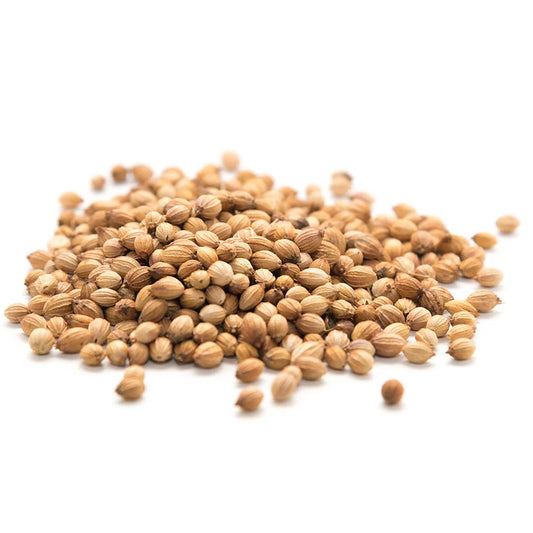

About Coriander Seeds
Harvested from the coriander plant, our premium Coriander Seeds are ripe with vitamins and essential minerals. Add our Coriander Seeds to some oven-roasted fries or ground them up with our Black Peppercorns to add a spicy kick to your scrambled eggs and pasta salads.
Benefits Of Coriander Seeds
-
Coriander seeds offer a burst of citrusy, floral flavor with a hint of earthiness and warmth, enhancing the taste of dishes they're added to.
-
Packed with antioxidants and anti-inflammatory compounds, coriander seeds aid digestion and soothe upset stomachs, promoting digestive health.
-
High in vitamin C, coriander seeds boost immunity, helping to strengthen the body's defenses against colds and flu.
-
Compounds found in coriander seeds help regulate blood sugar levels, making them a valuable addition to a balanced diet, especially for those managing blood sugar.
-
Beyond their health benefits, coriander seeds are prized for their flavor-enhancing properties, adding depth and complexity to a wide range of dishes from curries to marinades.
-
Coriander seeds are versatile in their usage, suitable for both culinary and medicinal purposes, offering a multifaceted approach to enhancing both flavor and well-being.
Uses Of Coriander Seeds
Seasoning Sensation: Sprinkle crushed coriander seeds over roasted vegetables, grilled meats, or even popcorn for a burst of flavor that takes your dish to the next level.
Curry Companion: Add whole coriander seeds to your favorite curry recipes to infuse them with a subtle yet distinctive flavor that will have everyone asking for seconds.
Pickling Power: Use coriander seeds in pickling brines to give your homemade pickles a zesty kick that will make them the star of any charcuterie board.
Herbal Helper: Brew coriander seed tea by steeping a teaspoon of seeds in hot water for a soothing drink that aids digestion and calms the stomach.
Baking Brilliance: Incorporate ground coriander seeds into your baking recipes for a unique twist on classic treats like cookies, cakes, and bread.
Soup and Stew Savior: Toss a handful of whole coriander seeds into your soups and stews during cooking to infuse them with a subtle, aromatic flavor that will have your family asking for seconds.
FAQ
Q: What do coriander seeds taste like?
A: Ah, the million-dollar question! Coriander seeds have a unique flavor profile that's a blend of citrusy, floral notes with a hint of earthiness. It's like a burst of sunshine in every bite! When ground, they have a warm, aromatic flavor that enhances dishes beautifully.
Q: How do I use coriander seeds in cooking?
A: Oh, the possibilities are endless! Crush them and sprinkle over roasted vegetables, add them to curry pastes and spice blends, or even toss them into pickling brines for a zesty kick. Get creative – coriander seeds can handle it! You can also toast them lightly before use to release their oils and intensify their flavor.
Q: Are coriander seeds good for me?
A: Absolutely! These little seeds are packed with vitamins, minerals, and antioxidants that are good for both your body and soul. They aid digestion, boost immunity, and add a burst of flavor to your dishes. Plus, they contain essential oils that have been studied for their potential anti-inflammatory and antimicrobial properties.
Q: Can I use ground coriander instead of whole seeds?
A: Sure thing! Ground coriander is a convenient alternative to whole seeds and works well in dishes where you want a smoother texture. Just remember that ground coriander loses its flavor faster, so it's best to grind it fresh when needed. However, whole coriander seeds are preferred for dishes where you want a bit of texture and crunch.
Q: Where do coriander seeds come from?
A: Coriander seeds are the dried fruit of the coriander plant, which belongs to the parsley family. They're native to regions spanning from Southern Europe to Southwest Asia and have been used in cooking for thousands of years. Fun fact: while coriander seeds and cilantro leaves come from the same plant, they have distinctly different flavors!
Q: Can I use coriander seeds in non-culinary ways?
A: Definitely! Coriander seeds have been utilized beyond the kitchen for their aromatic properties. You can crush them and add them to potpourri or homemade sachets to create a refreshing and fragrant atmosphere in your home. Additionally, some people use coriander seeds in natural skincare products for their potential antioxidant and soothing properties.
Recently Viewed
People Also Bought
Here’s some of our most similar products people are buying. Click to discover trending style.
